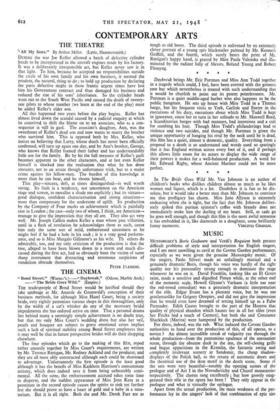THE CINEMA
" Bond Street." (Warner's.)—" Daybreak." (Odeon, Marble Arch.) —" The Bride Goes Wild." (Empire.) THE tradespeople of Bond Street would be justified should they take umbrage at Mr. Anatole de Grunwald's conception of their business methods, for although Miss Hazel Court, being a society bride, very rightly patronises various shops in this thoroughfare, only by the width of a cat's whisker do any of the necessary bridal impedimenta she has ordered arrive on time. That a personal drama lies behind many a seemingly simple achievement is no doubt true, but that nor only Miss Court's wedding dress but also her veil, pearls and bouquet are subject to grave emotional crises implies such a lack of spiritual stability among Bond Street employees that it may well be that in future prospective brides will do their shopping elsewhere.
The four episodes which go to the making of this film, roped rather uneasily together by Miss Court'S requirements, are written by Mr. Terence Rattigan, Mr. Rodney Ackland and the producer, and they are all most ably constructed although each could be shortened to advantage. Unfortunately the first episode is the least good although it has the benefit of Miss Kathleen Harrison's consummate artistry, which does indeed save it from being unbearably senti- mental. All the same, the embarrassment accrued takes some time to disperse, and the sudden appearance of Miss Jean Kent as a prostitute in the second episode causes the spirits to sink yet further lest she should prove to have a heart of gold and a baby in a sana- torium. But it is all right. Both she and Mr. Derek Farr are as tough as old boots. The third episode is enlivened by an extremely clever portrait of a young spiv blackmailer painted by Mr. Kenneth Griffith, and the fourth, which surely bears the print of Mr. Rattigan's happy hand, is graced by Miss Paula Valenska and illu- minated by the radiant folly of Messrs. Roland Young and Robert Flemyng.
* * * *
Daybreak brings Mr. Eric Portman and Miss Ann Todd together in a tragedy which could, I feel, have been averted with the greatest ease but which nevertheless is treated with such understanding that it would be churlish to point out its patent pointlessness. Mr. Portman is a quiet middle-aged barber who also happens to be the public hangman. He sets up house with Miss Todd in a Thames barge, but his frequent visits to York, Carlisle and Exeter in the executions of his duty, executions about which Miss Todd is kept in ignorance, cause her to turn in her solitude to Mr. Maxwell Reed, a Scandinavian bargee with bad manners, bad intentions and a cult for combing his hair. Though Miss Todd's philanderings lead to violence and two suicides, and though Mr. Portman is given the unique opportunity of hanging his rival by the neck until he is dead, this film has a quiet, almost a domestic, quality. Everything from a proposal to a death is so understated and words used so sparingly that it has England written across every foot of it, and if perhaps this allows little room for its actors to display the wide range of their powers it makes for a well-balanced production. A word for Mr. Edward Rigby, whose Ancient Mariner could not be more perfect.
* * * *
In The Bride Goes Wild Mr. Van Johnson is an author of children's books who dislikes children almost as much as he likes women and liquor, which is a lot. Doubtless it is fun to be dis- solute, but it would take a better man than Mr. Johnson to convince me that profligacy has charm. Miss June Allyson is extremely endearing when she is tight, but the fact that Mr. Johnson deliber- ately spiked this puritan spinster's coffee with brandy does not immediately make him the darling of my heart. Still, as cads go he goes well enough, and though this film is the most awful nonsense it has embedded in it, like diamonds in a doughnut, some brilliantly


































 Previous page
Previous page